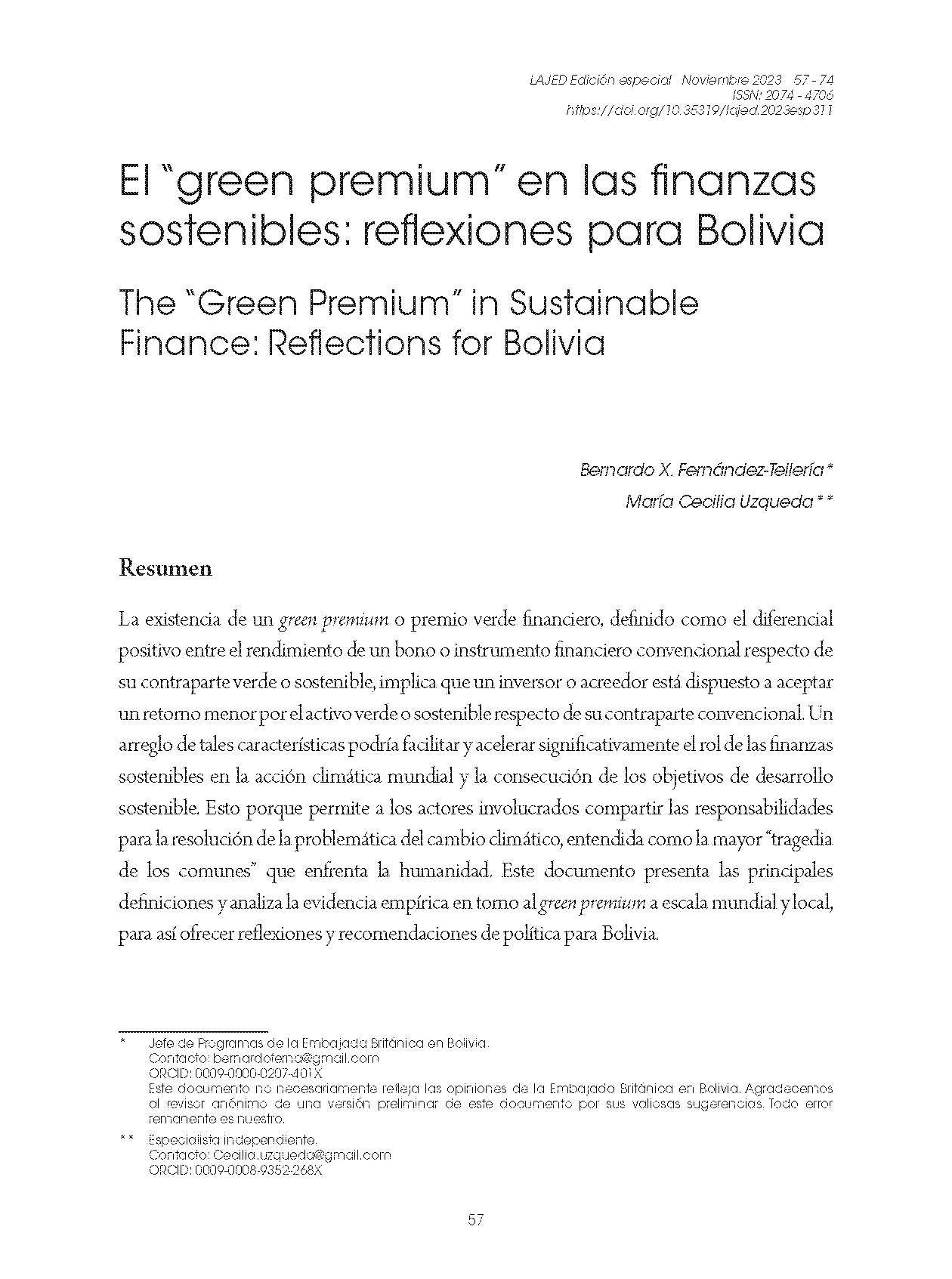El “Green Premium” en las finanzas sostenibles: reflexiones para Bolivia
DOI:
https://doi.org/10.35319/lajed.2023esp311Palabras clave:
Finanzas sostenibles, tragedia de los comunes, green premium, Cambio climático, BoliviaResumen
La existencia de un green premium o premio verde financiero, definido como el diferencial positivo entre el rendimiento de un bono o instrumento financiero convencional respecto de su contraparte verde o sostenible, implica que un inversor o acreedor está dispuesto a aceptar un retorno menor por el activo verde o sostenible respecto de su contraparte convencional. Un arreglo de tales características podría facilitar y acelerar significativamente el rol de las finanzas sostenibles en la acción climática mundial y la consecución de los objetivos de desarrollo sostenible. Esto porque permite a los actores involucrados compartir las responsabilidades para la resolución de la problemática del cambio climático, entendida como la mayor “tragedia de los comunes” que enfrenta la humanidad. Este documento presenta las principales definiciones y analiza la evidencia empírica en torno al green premium a escala mundial y local, para así ofrecer reflexiones y recomendaciones de política para Bolivia.
Descargas
Citas
Archer, M. (2022). The Ethics of ESG. Sustainable finance and the emergence of the market as an ethical subject. Journal of Global and Historical Anthropology. 22, 93. https://doi.org/10.3167/fcl.2022.930102
Baker, M., Bergstresser, D. Serafeim, G. y Wurgler, J. (2018). Financing the Response to Climate Change: The Pricing and Ownership of U.S. Green Bonds. http://dx.doi.org/10.2139/ssrn.3275327
Bernow, S., Klempner, B. y Magnin, C. (2017). From ‘why’ to ‘why not’: Sustainable investing as the new normal. McKinsey & Company. https://www.mckinsey.com/industries/private-equity-and-principal-investors/our-insights/from-why-to-why-not-sustainable-investing-as-the-new-normal
Bauer, M. Huber, D., Rudebusch, G. D. y Wilms, O. (2023). Where is the Carbon Premium? Global Performance of Green and Brown Stocks CESifo, Working Paper N° 10246. https://www.brookings.edu/research/where-is-the-carbon-premium-global-performance-of-green-andbrown-stocks/
Bhattacharya, A., Dooley, M. Kharas, H. y Taylor, C. (2022). Financing a Big Investment Push in Emerging Markets and Developing Countries for Sustainable, Resilient and Inclusive Recovery and Growth. Grantham Research Institute at LSE. Brookings Institution.
Carney, M. (2015). Breaking the tragedy of the horizon - climate change and financial stability.Lloyd’s of London Speech. Bank of England. https://www.bankofengland.co.uk/speech/2015/breaking-the-tragedy-of-the-horizon-climate-change-and-financial-stability
Druzin, B. (2016). The Parched Earth of Cooperation: How to Solve the Tragedy of the Commons, En International Environmental Governance. Duke Journal of Comparative & International Law. 27 (73), 73-105.
Fendt, L. (2021). Why did the IPCC choose 2°C as the goal for limiting global warming? Climate Portal MIT. https://climate.mit.edu/ask-mit/why-did-ipcc-choose-2deg-c-goal-limiting-global-warming
Georgieva, K., Gaspar, V. y Pazarbasioglu, C. (2022). Poor and Vulnerable Countries Need Support to Adapt to Climate Change. IMF Blog, Development. https://www.imf.org/en/Blogs/Articles/2022/03/23/blog032322-poor-and-vulnerable-countris-need-support-to-adapt-to-climate-change
Gianfrate, G. y Peri, M. (2019). The green advantage: Exploring the convenience of issuing green bonds. Journal of Cleaner Production, 219(10), 127-135. https://doi.org/10.1016/j.jclepro.2019.02.022.
Grzegorczyk, M. y Wolff, G. (2022). Greeniums in sovereign bond markets. Paper 17/2022, Bruegel.
Hardin, G. (1968). The Tragedy of the Commons: The population problem has no technical solution; it requires a fundamental extension in morality. Science, 162(3859), 1243-1248. Doi:10.1126/science.162.3859.1243
Kapraun, J., Carmelo, L., Scheins, C. y Schlag, C. (2021). (In)-Credibly Green: Which Bonds Trade at a Green Bond Premium? Proceedings of Paris December 2019 Finance Meeting EUROFIDAI -ESSEC. http://dx.doi.org/10.2139/ssrn.3347337
MacAskill, S., Roca, E., Liu, B., Stewart, R.A. y Sahin, O. (2021). Is there a green premium in the green bond market? Systematic literature review revealing premium determinants. Journal of Cleaner Production, 280(1).
Singh, M. y Patel, K. (2023). Keys to Climate Action. Financing Climate Change Mitigation and Adaptation in Developing Countries. Brookings Institution. Working Paper 180.12. https://www.brookings.edu/wpcontent/uploads/2023/02/Chapter-12.-Financing-climate-change-mitigation-and-adaptation-in-developing-countries.pdf
Schoenmaker, D. y Schramade, W. (2019). Principles of Sustainable Finance. Oxford University Press.
The City UK (2022). Green finance: A quantitative assessment of market trends. https://www.thecityuk.com/media/021n0hno/green-finance-a-quantitative-assessment-of-market-trends.pdf
Tso, K. (2021). How are countries held accountable under the Paris Agreement? MIT Climate Portal. https://climate.mit.edu/ask-mit/how-are-countries-held-accountable-under-paris-agreement
UNCTAD (2014). World Investment Report 2014. Naciones Unidas. https://unctad.org/system/files/official-document/wir2014_en.pdf

Descargas
Publicado
Cómo citar
Número
Sección
Licencia
Derechos de autor 2004 Revista Ciencia y Cultura

Esta obra está bajo una licencia internacional Creative Commons Atribución-NoComercial 4.0.




